14 start with N start with N
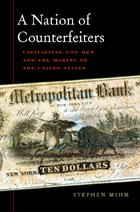
Listen to a short interview with Stephen MihmHost: Chris Gondek | Producer: Heron & Crane
Few of us question the slips of green paper that come and go in our purses, pockets, and wallets. Yet confidence in the money supply is a recent phenomenon: prior to the Civil War, the United States did not have a single, national currency. Instead, countless banks issued paper money in a bewildering variety of denominations and designs--more than ten thousand different kinds by 1860. Counterfeiters flourished amid this anarchy, putting vast quantities of bogus bills into circulation.
Their success, Stephen Mihm reveals, is more than an entertaining tale of criminal enterprise: it is the story of the rise of a country defined by a freewheeling brand of capitalism over which the federal government exercised little control. It was an era when responsibility for the country's currency remained in the hands of capitalists for whom "making money" was as much a literal as a figurative undertaking.
Mihm's witty tale brims with colorful characters: shady bankers, corrupt cops, charismatic criminals, and brilliant engravers. Based on prodigious research, it ranges far and wide, from New York City's criminal underworld to the gold fields of California and the battlefields of the Civil War. We learn how the federal government issued greenbacks for the first time and began dismantling the older monetary system and the counterfeit economy it sustained.
A Nation of Counterfeiters is a trailblazing work of history, one that casts the country's capitalist roots in a startling new light. Readers will recognize the same get-rich-quick spirit that lives on in the speculative bubbles and confidence games of the twenty-first century.

In National Duties, Gautham Rao makes the case that the origins of the federal government and the modern American state lie in these conflicts at government custom houses between the American Revolution and the presidency of Andrew Jackson. He argues that the contours of the government emerged from the push-and-pull between these groups, with commercial interests gradually losing power to the administrative state, which only continued to grow and lives on today.
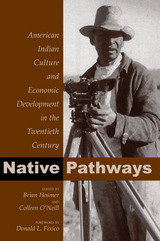
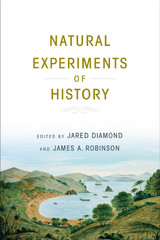
Some central questions in the natural and social sciences can't be answered by controlled laboratory experiments, often considered to be the hallmark of the scientific method. This impossibility holds for any science concerned with the past. In addition, many manipulative experiments, while possible, would be considered immoral or illegal. One has to devise other methods of observing, describing, and explaining the world.
In the historical disciplines, a fruitful approach has been to use natural experiments or the comparative method. This book consists of eight comparative studies drawn from history, archeology, economics, economic history, geography, and political science. The studies cover a spectrum of approaches, ranging from a non-quantitative narrative style in the early chapters to quantitative statistical analyses in the later chapters. The studies range from a simple two-way comparison of Haiti and the Dominican Republic, which share the island of Hispaniola, to comparisons of 81 Pacific islands and 233 areas of India. The societies discussed are contemporary ones, literate societies of recent centuries, and non-literate past societies. Geographically, they include the United States, Mexico, Brazil, western Europe, tropical Africa, India, Siberia, Australia, New Zealand, and other Pacific islands.
In an Afterword, the editors discuss how to cope with methodological problems common to these and other natural experiments of history.
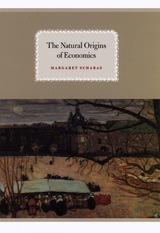
In The Natural Origins of Economics, Margaret Schabas traces the emergence and transformation of economics in the eighteenth and nineteenth centuries from a natural to a social science. Focusing on the works of several prominent economists—David Hume, Adam Smith, Thomas Malthus, David Ricardo, and John Stuart Mill—Schabas examines their conceptual debt to natural science and thus locates the evolution of economic ideas within the history of science. An ambitious study, The Natural Origins of Economics will be of interest to economists, historians, and philosophers alike.
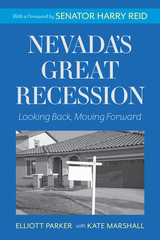
This is a different kind of economics book. Parker uses his expertise from doing research on the East Asian fiscal crisis to give profound insights into what happened and how to avoid future catastrophes. Marshall personalizes it by providing vignettes of what it was actually like to be in the trenches and fighting the inevitable political battles that came up, and counteracting some of the falsehoods that certain politicians were spreading about the recession.
Parker and Marshall’s book should be required reading for not only every single elected official in Nevada, but for any private citizen who cares about the public good.

A Foreign Affairs Best Book of the Year
A BBC History Magazine Best Book of the Year
“Excellent…A fascinating, authoritative account of the paths for China’s future explored during a decade long buried by official, state-sponsored history.”—Julia Lovell, Foreign Policy
“A vivid and readable account…Exceptionally well-researched.” —Andrew Nathan, Foreign Affairs
"The definitive book on China in the 1980s in terms of the depth of research and originality of the argument." ―Minxin Pei, author of The Sentinel State
"A gift to our understanding of today’s China."―Evan Osnos, author of Age of Ambition
On a hike in Guangdong Province in January 1984, Deng Xiaoping was warned that his path was a steep and treacherous one. “Never turn back,” the Chinese leader replied. That became a mantra as the government forged ahead with reforms in the face of heated contestation over the nation’s future.
Recovering the debates of China in the 1980s, Julian Gewirtz traces the Communist Party’s diverse attitudes toward markets, state control, and sweeping technological change, as well as freewheeling public argument over political liberalization. Deng Xiaoping’s administration considered bold proposals from within the party and without, but after Tiananmen, Beijing systematically erased these discussions of alternative directions. Using newly available Chinese sources, Gewirtz details how the leadership purged the key reformist politician Zhao Ziyang, quashed the student movement, recast the transformations of the 1980s as the inevitable products of consensus, and indoctrinated China and the international community in the new official narrative.
Never Turn Back offers a revelatory look at how different China’s rise might have been and at the foundations of strongman rule under Xi Jinping, who has intensified the policing of history to bolster his own authority.

This new focus requires new methods of analysis—historiographic strategies involving far greater archival resources, for instance, and often nontraditional resources, such as electronic records. Essays collected here address these changes and examine how this new emphasis on the work of living economists can and will entail interaction between the producer of theory and the historian, complicating the latter’s role. Chapters discuss topics such as the emergence of subdisciplines in economics, social-contextual perspectives on the writing of economics, the dynamics of idea development, and the recent incursion of noneconomic thinking—such as engineering methods and mathematical models—into economics.
New Economics and Its Writing shows that attention to recent, ongoing economics from historians of economics has the potential to revitalize and transform the history of economics as an area of investigation.
This volume is the 1997 Annual Supplement to the journal History of Political Economy. All 1997 subscribers will receive a copy of this book as part of their annual subscription.
Contributors. Timothy L. Alborn, Marcel Boumans, Joshua Cohen, John B. Davis, Ross B. Emmett, Paul Harrison, Daniel M. Hausman, Mary L. Hirschfeld, S. Todd Lowry, Steven G. Medema, Philip Mirowski, Philippe Mongin, S. Abu Turab Rizvi, Esther-Mirjam Sent

Cost-benefit analysis (CBA) has been an important policy tool of government since the 1980s, when the Reagan administration ordered that all major new regulations be subjected to a rigorous test of whether their projected benefits would outweigh their costs. Not surprisingly, CBA has been criticized by many who claim that it neglects, especially on the benefit side, important values that are hard to measure.
In this book, the authors reconceptualize cost-benefit analysis, arguing that its objective should be overall well-being rather than economic efficiency. They show why the link between preferences and well-being is more complicated than economists have thought. Satisfying a person's preference for some outcome is welfare-enhancing only if he or she is self-interested and well-informed. Also, cost-benefit analysis is not a super-procedure but simply a way to identify welfare-maximizing policies. A separate kind of analysis is required to weigh rights and equal treatment.
This book not only places cost-benefit analysis on a firmer theoretical foundation, but also has many practical implications for how government agencies should undertake cost-benefit studies.

The discovery of the New World was initially a cause for celebration. But the vast amounts of gold that Columbus and other explorers claimed from these lands altered Spanish society. The influx of such wealth contributed to the expansion of the Spanish empire, but also it raised doubts and insecurities about the meaning and function of money, the ideals of court and civility, and the structure of commerce and credit. New World Gold shows that, far from being a stabilizing force, the flow of gold from the Americas created anxieties among Spaniards and shaped a host of distinct behaviors, cultural practices, and intellectual pursuits on both sides of the Atlantic.
Elvira Vilches examines economic treatises, stories of travel and conquest, moralist writings, fiction, poetry, and drama to reveal that New World gold ultimately became a problematic source of power that destabilized Spain’s sense of trust, truth, and worth. These cultural anxieties, she argues, rendered the discovery of gold paradoxically disastrous for Spanish society. Combining economic thought, social history, and literary theory in trans-Atlantic contexts, New World Gold unveils the dark side of Spain’s Golden Age.
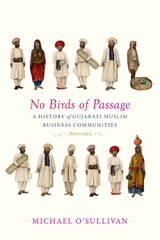
A sweeping account of three Gujarati Muslim trading communities, whose commercial success over nearly two centuries sheds new light on the history of capitalism, Islam, and empire in South Asia.
During the nineteenth century, three Gujarati Muslim commercial castes—the Bohras, Khojas, and Memons—came to dominate Muslim business in South Asia. Although these communities constitute less than 1 percent of South Asia’s Muslim population, they are still disproportionately represented among the region’s leading Muslim-owned firms today. In No Birds of Passage, Michael O’Sullivan argues that the conditions enabling their success have never been understood, thanks to stereotypes—embraced equally by colonial administrators and Muslim commentators—that estrange them from their religious identity. Yet while long viewed as Hindus in all but name, or as “Westernized” Muslims who embraced colonial institutions, these groups in fact entwined economic prerogatives and religious belief in a distinctive form of Muslim capitalism.
Following entrepreneurial firms from Gujarat to the Hijaz, Hong Kong, Mombasa, Rangoon, and beyond, O’Sullivan reveals the importance of kinship networks, private property, and religious obligation to their business endeavors. This paradigm of Muslim capitalism found its highest expression in the jamaats, the central caste institutions of each community, which combined South Asian, Islamicate, and European traditions of corporate life. The jamaats also played an essential role in negotiating the position of all three groups in relation to British authorities and Indian Muslim nationalists, as well as the often-sharp divisions within the castes themselves.
O’Sullivan’s account sheds light on Gujarati Muslim economic life from the dawn of colonial hegemony in India to the crisis of the postcolonial state, and provides fascinating insights into the broader effects of capitalist enterprise on Muslim experience in modern South Asia.

In The Credit Crunch, Graham Turner predicted that banks would be nationalised and interest rates would be reduced too slowly to halt the crisis. His predictions were correct. His new book, No Way to Run an Economy, is the essential guide to the turbulent times ahead.
Turner recommended radical measures, such as quantitative easing, in early 2008 but argues that action has been taken too late and been too timid to make a real difference. He dissects the policy mistakes of the last 12 months including Obama's doomed market-led response to the crisis and the obsession of central banks with the red herring of inflation.
There is no doubt the economy is still in serious trouble, but Turner shows that learning from the mistakes made so far can prevent a situation worse than that of the 1930s crisis.
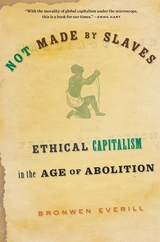
How abolitionist businesses marshaled intense moral outrage over slavery to shape a new ethics of international commerce.
“East India Sugar Not Made By Slaves.” With these words on a sugar bowl, consumers of the early nineteenth century declared their power to change the global economy. Bronwen Everill examines how abolitionists from Europe to the United States to West Africa used new ideas of supply and demand, consumer credit, and branding to shape an argument for ethical capitalism.
Everill focuses on the everyday economy of the Atlantic world. Antislavery affected business operations, as companies in West Africa, including the British firm Macaulay & Babington and the American partnership of Brown & Ives, developed new tactics in order to make “legitimate” commerce pay. Everill explores how the dilemmas of conducting ethical commerce reshaped the larger moral discourse surrounding production and consumption, influencing how slavery and freedom came to be defined in the market economy. But ethical commerce was not without its ironies; the search for supplies of goods “not made by slaves”—including East India sugar—expanded the reach of colonial empires in the relentless pursuit of cheap but “free” labor.
Not Made by Slaves illuminates the early years of global consumer society, while placing the politics of antislavery firmly in the history of capitalism. It is also a stark reminder that the struggle to ensure fair trade and labor conditions continues.

“Impressive…[Readers] will be rewarded with greater understanding of historical developments that changed the relationship between consumers and producers in a global economy in ways that reverberate to this day.”
—Wall Street Journal
“Everill repositions West Africa as central to the broader Atlantic story of 18th and 19th century economic morality, its relationship with commercial ethics, and the expansion of capitalism.”
—Financial Times
“Offers a penetrating new perspective on abolition in the British Empire by spotlighting a particular cast of characters: the commercial abolitionists in West Africa who fashioned a consumer-focused, business-friendly antislavery ethics. These figures sought to prove the moral and economic superiority of non-slave labor while profiting from the transition away from slavery…Impressive.”
—Jacobin
“East India Sugar Not Made By Slaves.” With these words inscribed on a sugar bowl, nineteenth-century consumers were reminded of their power to change the global economy. Determined to strike at the heart of the slave trade, abolitionist businesses throughout the Atlantic used new ideas of supply and demand, consumer credit, and branding to make the case for ethical capitalism.
Consumers became the moral compass of capitalism as companies in West Africa, including Macaulay & Babington and Brown & Ives, developed clever new tactics to make “legitimate” commerce pay. Yet ethical trade was not without its problems. The search for goods “not made by slaves” unwittingly expanded the reach of colonial enterprises in the relentless pursuit of cheap labor. Not Made by Slaves captures the moral dilemmas roiling the early years of global consumer society and is a stark reminder of the unintended consequences of relying on consumer self-interest to transform global capitalism.
READERS
Browse our collection.
PUBLISHERS
See BiblioVault's publisher services.
STUDENT SERVICES
Files for college accessibility offices.
UChicago Accessibility Resources
home | accessibility | search | about | contact us
BiblioVault ® 2001 - 2024
The University of Chicago Press









